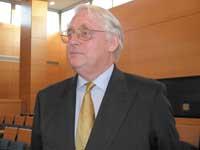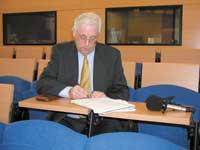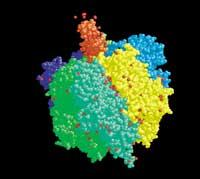John Walker: "Instead of using parts of biomachines, it is better to understand and apply their chemical base"
In their time in Cambridge, prestigious scientists worked. Why Cambridge? Do these things happen by chance?
I believe that the success of the University of Cambridge lies in the tradition of research. There good people work, and that attracts many good people. In this way, tradition progresses little by little and can bring together important generations of researchers. That is why I think Cambridge has been and will be a great benchmark in England.
Do you think that in England interest in science has been reduced?

At least in Cambridge no. There were many important scientists, but those who are now very good and I don't think there is less interest.
Did you meet Watson and Crick?
James Watson did not, but when I arrived in Cambridge, Francis Crick was still working there. He was a person of great personality, very fond of theoretical debates. At that time, in the university bar, in the canteen, anyone made public the discussions. It was not difficult to find Crick in these cases.
And Linus Pauling?
I was with Linus Pauling twice. He once came to give a lecture to Cambridge. The second was curious: I found him at a bar in Moscow. There were not many places to have breakfast around me, I went to one of them and there I met Linus. I showed up and had breakfast together. I told him about my work and he listened to me with great interest. He had a lot of listening skills, unlike Crick.
Addressing the subject of your research, how do you manage mitochondria energy?
Use a complex protein system. But the basis is the accumulation of protons inside the membrane. This generates a gradient in the concentration of protons, and the deposition of protons releases energy. Protons therefore have the same function as water in hydroelectric power plants. And the proteins present in the mitochondrial membrane synthesize ATP molecules with this energy. The rest of the cell's chemical processes can use energy stored in ATP molecules.
These proteins form a biomachine. Are there other similar systems in cells?
Yes, and not only in cells. These biomachines are rotors, that is, this system connected to the membrane has moving parts in rotation. Therefore, many microorganisms, instead of using this rotation to generate ATP, use it to move a scourge. In this case it is also a proton pump, but it is used mechanically instead of storing the energy chemically.
From a mechanical point of view, the most important movement of a protein is the change of forming of the entire molecule. Is biophysics a new way to study proteins?

The chemical reaction is due to the physical changes of this shaping change. They group the reagents that must participate in a reactable way. The analysis of the concrete mechanism allows a better understanding of the process. The catalytic zone is generated only by the union of certain amino acids. These movements of formation of the catalytic zone are accompanied by a general change of attitude of the protein. They are part of the mechanism. And it is essential to understand these changes to understand the chemical reaction that occurs inside. Therefore, proteins are mechanical devices that produce chemical reactions.
Is it possible for a protein to catalyze a chemical reaction without function only to achieve a global position change?
The rotation movements we investigate are closely related to the catalyzing reaction of proteins. One depends on the other. There are few exceptions, but in general they are very specific movements and everything that happens has one goal or another. There are no sterile processes.
However, protons can pass through some membranes without reacting, so they can make a sterile pathway. It is very interesting and not understood as it happens. In fact, 30% of the energy we produce is used in such processes. Therefore, we are not 100% efficient. To a certain extent, the less efficient people are the lucky ones, since if we eat a lot do not get fat, those that are 100% effective get much fat with the same amount of food.
Therefore, researchers are very interested in this topic, they are biological processes related to obesity. In our laboratory, for example, it is a priority issue. We are studying obesity and related diabetes.
What other processes are you investigating?
In our laboratory we also investigate the biological processes of aging. We want to know if mitochondria is involved in these processes. Oxygen radicals are generated as a side product in the energy transformation mechanism. These radicals are very harmful, they can damage the DNA of the mitochondria and we believe that this process has to do with aging.
Mitochondrial DNA deteriorates earlier than nuclei, so as we age we lose energy production capacity, feel increasingly tired, etc. It is a process of degeneration. Understanding its mechanism, the following question arises: Is it possible to interrupt or slow down the process? This guides us towards the research of anti-radical substances, such as vitamin C and other antioxidants. These products can prevent radical reactions.

In many areas of medicine you can apply what you learn from these basic biology systems.
The protein systems you research are rotors and molecules sized devices. Can elements of these systems be used for nanotechnology, i.e. for the manufacture of artificial nanomachines?
This idea, of course, cannot be ruled out. But there are many problems. These biomachines are easily broken. They are not easy to handle. For example, if they were part of a chip, they would have to be an ideal environment to stay stable for a long time, otherwise they would degrade quickly. They would have big problems, so I would make another proposal. Instead of using parts of biomachines, we can try to understand the chemical basis of operation and apply the principles learned to man-made nanomachines. Nanomarines will also be simpler than biomachines due to their complexity.
There are some examples. Some scientists have taken proteins with bioenergetic functions and used them as switches in chips. So you can't reject the idea, but I think it's not easy at the moment.
Currently there is a greater tendency to analyze biochemistry from a chemical point of view than from a biological point of view. So it seems. Recognizing that both approaches are necessary, how do you see the contribution of each area?
I think both are necessary. I have developed my career in medical research, but I have worked in multidisciplinary institutes. I have had biologists, chemists, doctors, theoretical mathematicians and experts in different fields of science. In this way, everyone worked with a vision of a certain biological system, but taking into account the incidents of all others. The sum of all these studies is fruitful. Therefore, I believe that such systems cannot be understood from a single point of view, either from biology or chemistry.
Buletina
Bidali zure helbide elektronikoa eta jaso asteroko buletina zure sarrera-ontzian








